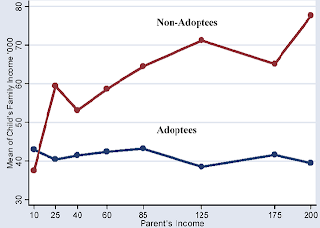During a heated discussion with my girlfriend the other day, I brought up the graph below from
a post I saw on Marginal Revolution. It's summary data from an adoption study when primarily Korean children were adopted by American families of various incomes between 1970 and 1980. Now in their 20s and 30s, the graph summarizes their parents income (presumably at the time of adoption, hopefully adjusted for inflation) along the x-axis and the child's average income along the y-axis.

This, I said, is a very interesting study: adopted kids did about the same (on average) regardless of who brought them up. But when they are the natural kids of the parents, they do better on average. Since it's reasonable to say other effects are constant across incomes (such as how parents treat an adopted child), the data suggests that genetics play a critical role in determining income and that the wealthy are not wealthy simply because their parents were. (Note there is still a high level of income mobility in the data: 10K a year parents averaged almost 40K a year kids; 200K a year parents averaged only about 78K a year kids...though the latter point could be argued by wealthier kids opting for jobs with fewer financial awards and more non-pecuniary benefits.)
Tanya didn't agree on a few levels, for one arguing that it suggests low black incomes are low because blacks are stupid. But the study doesn't say that environmental factors don't influence future prospects (though I am admittedly surprised to see how uncorrelated adopted incomes were with their parents) nor was it a perfect study. Since adoption agencies are ethically bound to make sure the couple could provide for the child before adoption, the selection bias would overestimate the success at the lower levels of income.
Tanya was also concerned about effects embedded in the adoption. Since the kids were Korean, they were clearly adopted. Thus, she argues, issues of racism and the stigma of being adopted washed out and overshadowed any advantage wealthier kids had. Sure, this exists, but I'm not convinced these factors are so strong it would wash away all environmental advantages. Yes, the children grew up in the 70s and 80s, where racial tension was likely stronger compared to now, but such tension tends to lean toward the Afro-American and (to a lesser degree) Hispanic populations, not Southeast Asians.
Really, I have don't know how much racism is in America. Most people don't know. Of course, it still exists and minorities will have first hand experience with it. But that doesn't mean it's common. Similarly, most white people I know (myself included), are good people and most scared of a misunderstanding being mistaken for racism. That does not mean most white are
not racists. And surveys done on the issue are going to have major credibility issues about the honesty of people's responses. I can say with confidence that black incomes are rising, interracial couples are more common, and companies are very concerned with being thought of as inclusive; at least things seem to be getting better.

